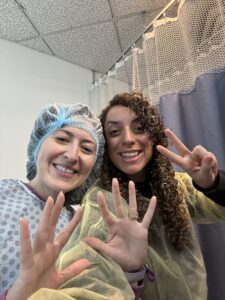An Interview with Dr. Caleigh Sumner, ND, Founder of Folia Fertility
Pride Month Spotlight
When Caleigh and her wife decided to start a family, they were filled with excitement, hope—and a clear vision. As a fertility-focused naturopath, Caleigh brought knowledge and intentionality into the process. They opted for reciprocal IVF: her wife’s eggs, donor sperm, and Caleigh’s uterus. For Caleigh, the opportunity to carry was deeply meaningful. “I wanted it more than anything,” she says. “It seemed like the perfect scenario.”
Both partners underwent egg retrievals, yielding 16 embryos. Eight were genetically normal. “We were over the moon,” Caleigh recalls. “Statistically, we were guaranteed at least one baby—maybe even three. We felt so prepared and so rewarded for all the effort we had put in.”
But as their journey unfolded, the reality was far from predictable.
A Hopeful Start, A Crushing Series of Losses
Despite everything being “by the book,” none of their embryos implanted successfully in Caleigh’s body. After multiple transfers and an endometriosis surgery that seemingly made no difference, they pivoted to her wife’s body. That too ended in miscarriage. They tried again with Caleigh—another loss.
“All eight embryos were gone,” Caleigh says. “We were devastated. We felt like we had done everything right. It just made no sense.”
What followed was a painful but privileged decision: to keep going. Thanks to financial resources and professional access, they explored reproductive immunology, switched clinics multiple times, and completed a third egg retrieval—resulting in four more euploid embryos and one mosaic.
Then Came the Miracles
Excited by their new transfer plan, they tried yet another embryo in Caleigh’s uterus; it didn’t work, but they also transferred one to her wife’s uterus— and it took! They were cautiously optimistic, but nothing was guaranteed after all they had gone through. Emboldened, they gave Caleigh’s body one final chance, transferring a euploid and the mosaic embryo. Miraculously, both implanted. Completely unexpected.
The couple suddenly found themselves expecting three babies—two carried by Caleigh, one by her wife. “We were completely floored,” she says. “After 12 failed transfers, we couldn’t believe it. We had three healthy baby boys. It was nothing short of a miracle.”
Being Queer in a Fertility System That Isn’t Built for You
As joyful as the outcome was, Caleigh’s journey through the fertility system was marked by bias and invisibility. She and her wife were repeatedly mistaken for sisters. Clinicians casually referenced “husbands” or “dads.” One technician even asked if “dad” should come into the room.
“The fertility world is still very heteronormative,” she explains. “It’s mostly harmless, but it’s exhausting—and at times, hurtful.”
One moment especially stands out: a doctor performing their sixth embryo transfer remarked on how “lucky” they were to have “double the eggs and double the uterus.” The comment ignored their profound losses and made them feel like failures in a space where they were assumed to be doubly fertile.
Another doctor, when meeting Caleigh ahead of her long-awaited endometriosis surgery, dismissed her concerns and simply suggested using her wife’s body instead. “That would never happen in a heterosexual couple,” she says. “I would have received care without question. I should never be overlooked just because I am in a same-sex relationship”
From Patient to Practitioner: Advocating with Empathy
These experiences changed how Caleigh practices. Already grounded in individualized care, she now approaches her work with even more fire and empathy.
“I know what my patients are going through—the appointments, the jargon, the medications, the questions, the emotional rollercoaster – it’s endless. I’m committed to helping them advocate for themselves and to create care plans that reflect their unique needs. My heart was already on my sleeve, but now it’s fully out there.”
A Message to the 2SLGBTQ+ Community This Pride Month
To those still in the midst of their journey, Caleigh has a powerful message:
“The world needs more families like yours. If you want to keep going, please do. Don’t give up unless you’re truly ready. Access support like Fertility Friends Foundation, work with inclusive practitioners, and know that you deserve to become a parent. Your family deserves to exist and to be represented.”

